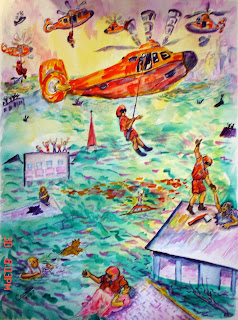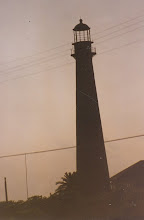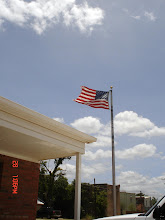 The Flute Section (sketch)
The Flute Section (sketch) 8.5" x 11"
pencil
Tonight is a big night, especially in this area of Texas, and other places too. This is the night of the first football game of the school year. Teams have new suits and equipment, and have practiced and been pumped up-ready for the opening game. Pep rallies have taken place. The band, dance teams, flag corps have worked on their routines and readied their costumes for their debut. Parents and fans anxiously wait to see their students take part in the rituals of the game. Coaches may tend to pace and chew their nails. Teachers are busy with their duties as sponsors of organizations, or in their duties of working the gate or patrolling to make sure that there are no problems in the stands. And school related organizations are ready to sell their wares and make a little money for this school year.
"The Flute Section" is a sketch I did, remembering our little group in the band hall, four flutes, and the band director, concentrating on the music and the young musicians in front of him. Of course, there were others behind us, on the other side of the director, and to our right in front of the director. This drawing began as we were getting ready for our high school reunion this past June.
We were fortunate to have an excellent band director. When he came to our school, our band went from about 19 to 60 members. He was young, and the girls thought he was cute, so the band grew. Later, he went on to become a long time director of the Texas Aggie band at Texas A&M University. And, of course, they have always had a fantastic military style band. We weren't that good, but we had some outstanding training over our years as part of the Calvert High Trojan band.
My friend and neighbor, Edie, who I shared school supplies with in an earlier post, also played flute and was always one chair, and a grade, ahead of me. Ruth Ann was one chair, and a grade, behind me, and Sandra followed her.
The school owned a beautiful wood and silver (like a clarinet or oboe) German flute. They obtained it from the POW camp that was located near the next town, Hearne, at the end of WWII as prisoners were being sent home. The school also had several other instruments that had belonged to prisoners. In fact, our band hall was one of the barracks that had been at the POW camp. Prior to that, the band had to meet in a small choir room or the cafeteria, with practice for programs on the auditorium stage, or on the football field.
The flute had the most wonderful tone and was so much easier to play than the silver flutes we all had.
The person who was first chair in the flute section got to play the German flute. Edie was first chair until she graduated. Then it was my turn. When she was a senior and I was a junior, she was out of school for the usual two weeks with the mumps, so I got to move up to first chair while she was sick.
I didn't want to go to school, so I always hoped to catch anything that came along. When there was an outbreak of mumps, I heard that you could catch them if you drank after someone who had mumps. There wasn't much opportunity for that. I didn't think that you could catch anything from playing an instrument, but I did. Edie returned and reclaimed the flute and first chair, when she was well. And, then it was my turn. I had the most horrible case of mumps! I was so swollen, I couldn't lift my head off the pillow for two weeks. My face and neck were even with my shoulders. But that was okay with me, although I was pretty miserable. I got to be at home for two whole weeks.
Edie graduated and went off to college, and I moved up to first chair my senior year. I was sure that I was playing much better with that special flute. Until then, I had been using my aunt's flute, that she had also used when she was in the Calvert High and Baylor University bands.
Still, I was shy, and didn't really want anyone to hear me or notice me. That was really hard when I had to sit on the outside row of the band. Before that, I could hide behind Edie. I didn't think I could read music very well either. But, I had this sort of gift, I guess you could call it. If I could hear the first note of something, I could play, or sing, the rest of the music, even if I had never heard it before. I would tell people to start me off, and away I would go with it. If it was a familiar first note, I was okay with it and could sound it out myself. But some things seemed like they were just blocked, to me. Sort of like math.
While my mother taught piano lessons, and I would sing with her in the choir and at home, I didn't take advantage of what she tried to teach me. I was more interested in other things, and didn't like the sound of a lone piano.
Graduation time came for me and I wanted to go to nursing school. But, at 16, I was too young. I was accepted, but had to wait until I was 18. Meanwhile, I went off to a teachers college, a place my family felt was acceptable for a young lady. The school offered to sell me the German flute, if I would be in the college band. Being shy, I wasn't sure about that, but I really wanted that flute. Daddy said I already had my aunt's flute that I could play, if I wanted to be in the band, and refused to pay the $20 for it. I thought I wasn't good enough to be in a college band, and didn't want to get in front of all those people, so I just went to school and tried not to be in anything. (They wouldn't let that happen, though. We had to go to everything!)
As I was going off to college, my high school English teacher talked to me on Main Street one day. She asked what I was going to major in. I didn't know what that meant. She told me that she thought I should major in Art, since I was always drawing instead of doing my work, and minor in English. She also advised me to not let anyone borrow anything of mine. She said I would end up without even face powder or ink of my own if I let others start borrowing my things. So, at registration, I told the people at the desks that I would major in Art and minor in English, and they entered that on my paperwork. I still wasn't sure what it meant! And my classmates thought I was a really stingy person because, when anyone wanted to use my bottle of ink to refill their pen, or borrow a sheet of paper, I said "No", and pulled all my things close to me. I kept a close watch on all my things. My $5 a week allowance would not go far if I had to replace my personal things.
Anyway, there were some tense times in the flute section, when the band director would get mad at students who didn't play a passage correctly, had not practiced, or were talking and giggling. Band directors could certainly be temperamental, but nice, and even fun, at other times. Although we were practically sitting under his nose, we would still take every opportunity to share our dreams and our secrets. We didn't think he could hear, but I'll bet he heard some interesting things. Hopefully he was, as we thought, engrossed in his music and not listening to our little girl secrets.
My little sister played saxaphone and sat behind us, when she got in band, and my boyfriend all through school days, played trombone, and also sat behind the flute section. My cousin, Doris, who was in my class, played French horn, and was seated to my right, facing the director.
We had some interesting experiences as members of the band. There were trips such as the ones to march in the Houston Fat Stock Show parade. (A couple of times, we got to see Roy Rogers and Dale Evans up close, when they were in the parade. I distinctly remember that we all tried to stay in line, but had to march around Trigger's poop in the street. Roy and Dale were carrying coat hangers with western shirts into the arena as we were in formation, waiting on the parade to start.) We went to Baylor University in Waco for band contest, and we went to the Trojan football games to march and play during the game.
There was snuggling up under quilts when it was cold and being miserable from itchy wool uniforms when the weather was hot. And watching the couples smooch during ball games as they parked under the bleachers, thinking no one would see them there. The band did. But, I learned to tie a tie, which helped me even recently when I had to tie my grandson's tie! And we marched, and learned discipline, and had to face our fears of performing in front of people. It was easier when we were with a group of our friends who we saw daily.
Shannon P. Husbands has a lovely flute drawing today on her blog, M.E. Art. It made me think of the days when I played flute. Can't do that anymore. After a certain age, I guess, the lips just won't cooperate anymore. My daughter also played flute for a while and we still have that flute.
I tried to get a group together, when I was teaching, of people in the community who had enjoyed being in band in their younger days. The band director helped us and met with us to direct on Sunday afternoons. That was fun. We hoped to practice enough to give concerts in the park or go to nursing homes. But, the band director left, and the following directors didn't want to give up their Sunday afternoons. And, for a while, there was a shortage of band directors and the school didn't have anyone to fill that position.
There is a new high school here named for General Earl Rudder. The school won't be finished until next year, but they had their first football game last night! They're getting an early start on school spirit and traditions. Students are attending classes at the existing high school until the school is ready. They already have faculty and staff and all is ready, except for the building. Rudder's Rangers won their first game, 45-0.
Good luck to all the teams, and everyone involved, tonight. It is a big night in Texas, and many other towns in America.
Besides the time when I was in the band, I think the time that I most enjoyed football games, was when my grandson played, or when we had games at home in the yard, and when, as an elderly lady, I was out on the field, among the kids, taking pictures for the yearbook and newspaper. That was interesting since I had not had the opportunity to look at things from the same viewpoint as the players. I had seen what the field looked like as a member of the band.
There was a film clip on the Texas A&M band in which it looked like you were marching behind someone in the band. That brought back memories.
As for that beautiful German flute, I heard that it was destroyed when it came into contact with a football helmet at a game after I went away to college. I've never seen another one like it. But, in looking for German flutes, I've found some flutes that are made of things like clay and even glass. I thought it might be neat to try to make a flute from clay. A glass flute sounds interesting, but that's something I have never tried to work with.





































